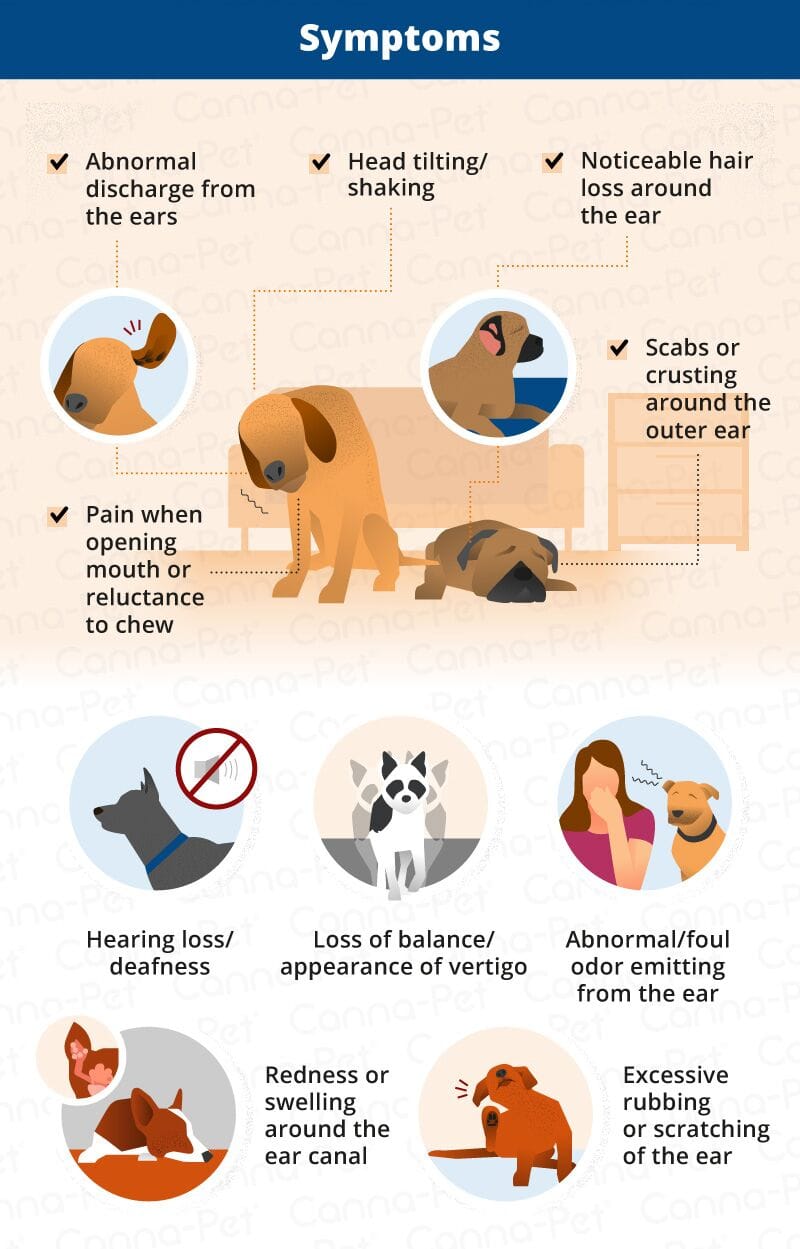As a dedicated dog owner, recognizing the signs of common health issues is a crucial aspect of your pet’s overall well-being. While symptoms can differ from humans, certain behaviors, like persistent head shaking or excessive scratching at the ears, could indicate a canine ear infection, also known as otitis. Dogs, with their unique ear canal structure, are particularly susceptible to these infections, making it one of the most frequent reasons for veterinary visits.
Recognizing the Symptoms of Ear Infections in Dogs
Ear infections can cause significant discomfort for dogs, and their inability to verbally express pain makes it essential for owners to be vigilant. Key signs to watch for include:
- Behavioral Changes: Frequent head shaking, tilting the head, pawing at the ear, or increased scratching.
- Visible Inflammation: Redness and swelling within the ear canals.
- Sensitivity: Your dog may yelp or pull away when their ears are touched.
- Discharge and Debris: Presence of yellow, green, brown, or black discharge or crusting in the ears.
- Odor: A noticeable, often sweet or musty, smell emanating from the ear, typically associated with yeast infections.
- Hearing Issues: A potential sign, especially in severe cases, is a decreased response to commands, suggesting hearing loss.
Dr. Jamie Whittenburg, a veterinarian, notes that head shaking is the most common indicator, often accompanied by scratching or rubbing the ears on surfaces.
Common Causes of Canine Ear Infections
The root of most ear infections in dogs lies in an overgrowth of bacteria or yeast, or a combination of both, within the ear canal. Several factors can contribute to this imbalance:
- Allergies: Underlying allergies can make dogs more prone to ear issues.
- Moisture: Water trapped in the ear canal after bathing or swimming creates a breeding ground for microbes.
- Anatomical Traits: Breeds with narrow ear canals or large, floppy ears (like Basset Hounds or Cocker Spaniels) are at higher risk.
- Other Factors: Autoimmune disorders, foreign bodies (such as grass awns), and injuries to the ear canal can also play a role.
While ear mites are a common cause in cats, they are rarely seen in adult dogs.
Diagnosis and When to Seek Veterinary Care
If you observe any unusual changes in your dog’s ears, consulting your veterinarian is the best course of action. Symptoms of ear infections can mimic other serious conditions like polyps, tumors, hematomas, or even neurological diseases, making a professional diagnosis essential.
Treatment Options for Dog Ear Infections
A veterinarian will diagnose the specific type of ear infection—otitis externa (outer ear), otitis media (middle ear), or otitis interna (inner ear)—to tailor the most effective treatment plan. Otitis externa is the most prevalent type in dogs.
Treatment often involves a combination of:
- Ear Drops: These are crucial for treating chronic infections and are applied directly into the ear. Many contain a blend of antifungals, corticosteroids, and antibiotics to reduce inflammation, pain, and infection. Examples include Mometamax, Claro, and Otomax.
- Antibiotics: Oral antibiotics may be prescribed for bacterial infections. It’s vital to use canine-specific dosages as prescribed by your vet, as human medications can be toxic to dogs due to differences in metabolism. [cite:0, cite:1] best ear medicine for dogs
- Antifungal Medications: Ointments, creams, or oral medications are used to combat fungal infections. Ketodan (ketoconazole) is one example.
- Anti-inflammatory Medications: Veterinarians may prescribe canine-specific NSAIDs. Over-the-counter human NSAIDs like ibuprofen and acetaminophen should never be given to dogs due to severe health risks. Meloxicam is a commonly prescribed option.
- Surgery: In severe or chronic cases unresponsive to medical treatment, surgical procedures like a total ear canal ablation (TECA) might be necessary.
Common Medications for Dog Ear Infections:
| Drug Name | How to Administer | Coupons |
|---|---|---|
| Augmentin | Oral | Augmentin coupons |
| Enrofloxacin | Enrofloxacin coupons | |
| Cleocin | Cleocin coupons | |
| Cefpodoxime | Cefpodoxime coupons | |
| Sporanox | Sporanox coupons | |
| Meloxicam | Meloxicam coupons | |
| Cephalexin | Cephalexin coupons | |
| Ketodan | Ketodan coupons | |
| Miconazole | Topical | Miconazole coupons |
best medicine for ear infection in dogs
Addressing Ear Infections at Home
It is crucial to understand that dog ear infections typically do not resolve on their own. Attempting home remedies without veterinary guidance can exacerbate the infection and potentially lead to permanent damage, including eardrum rupture and deafness. Dr. Whittenburg strongly advises against using over-the-counter or at-home treatments for established infections, emphasizing the need for prescription medications. Likewise, remedies involving vinegar or hydrogen peroxide can irritate the delicate ear canal.
Prevention Strategies for Ear Infections
Maintaining clean and dry ears is paramount in preventing infections, especially for breeds prone to moisture buildup or those that frequently swim. This often involves using a veterinarian-approved ear cleaner and gently massaging the base of the ear flap.
For dogs experiencing recurrent infections, identifying and managing the underlying cause, such as allergies or autoimmune issues, is essential for long-term prevention. Nutritional supplements like omega-3 fatty acids may also support skin barrier function and reduce susceptibility to infections. allergy medicine for dogs
Regularly inspecting your dog’s ears for changes in color, condition, or odor is one of the best preventative measures. Knowing what a healthy ear smells and looks like will help you quickly identify when something is amiss.
In conclusion, your pet relies on you for their health. If you suspect an ear infection or notice any irregularities, schedule a veterinary appointment promptly to ensure your dog receives the necessary care and relief. best ear drops for dogs ear infection

